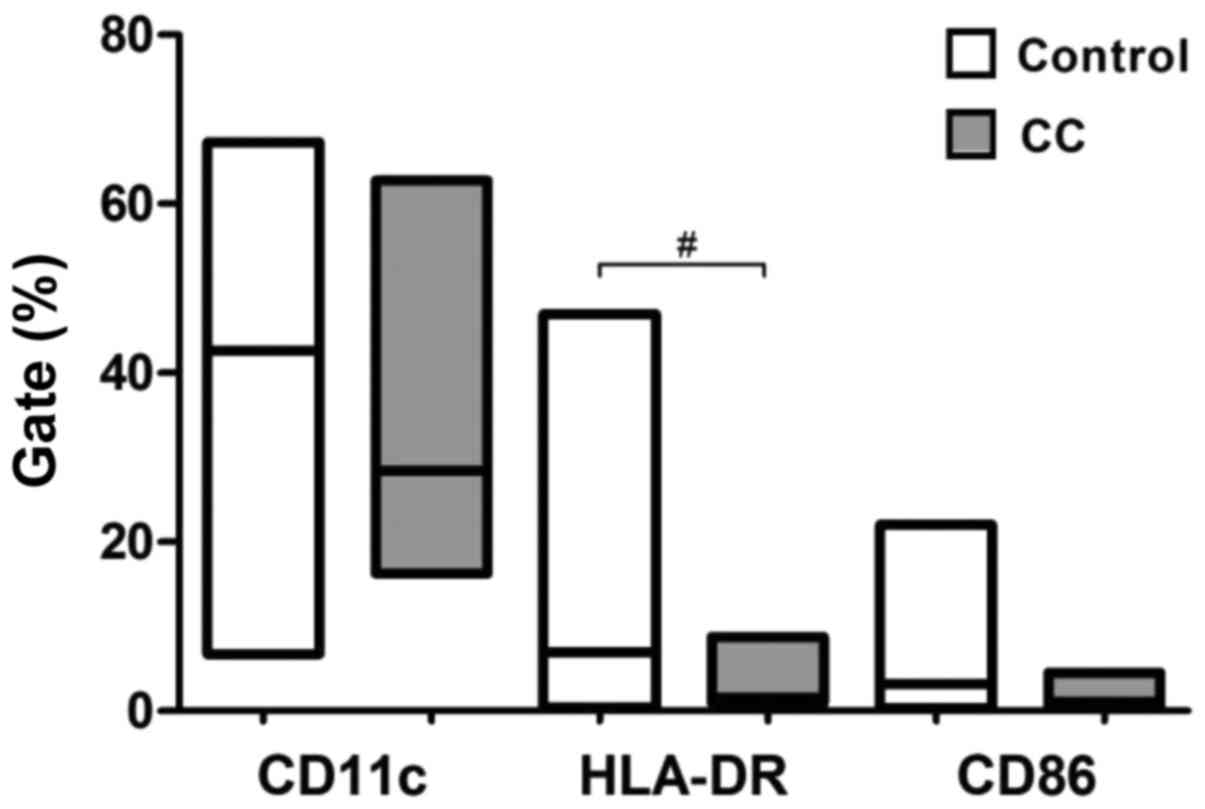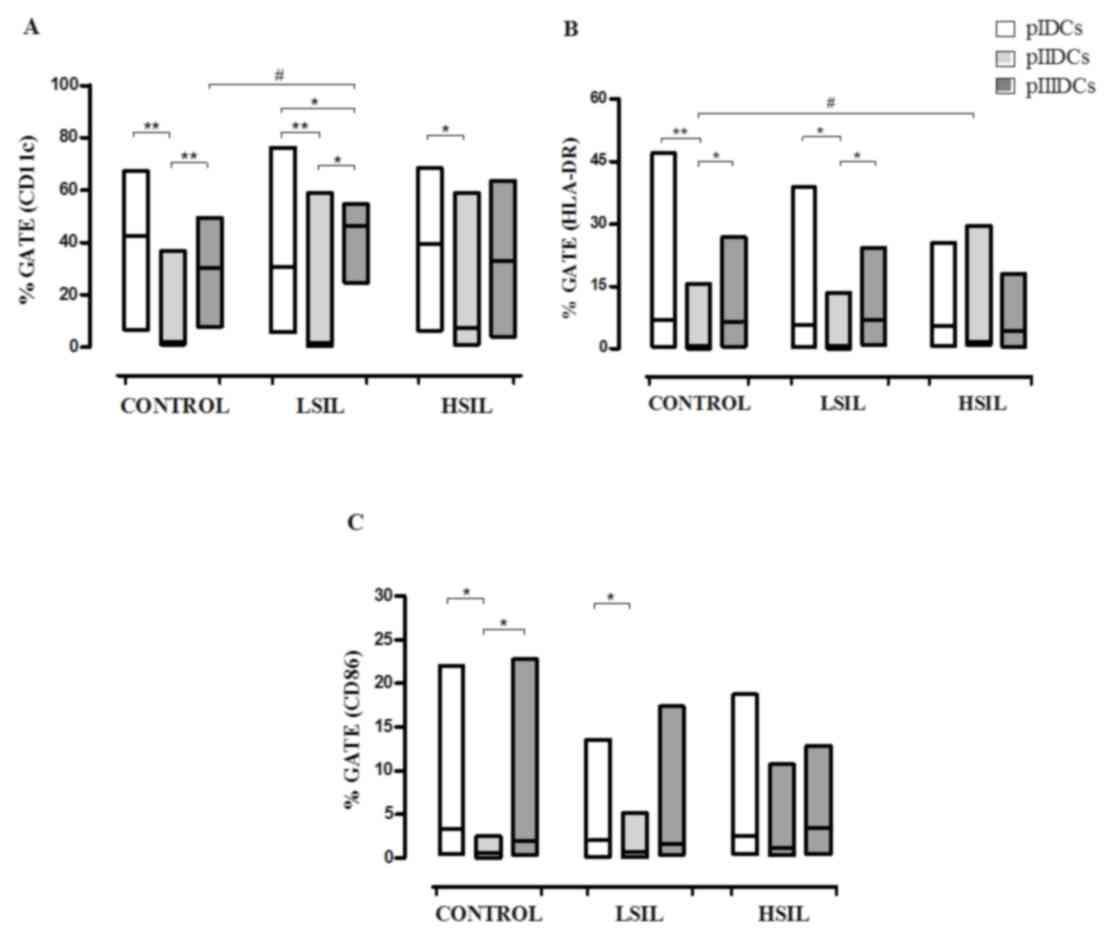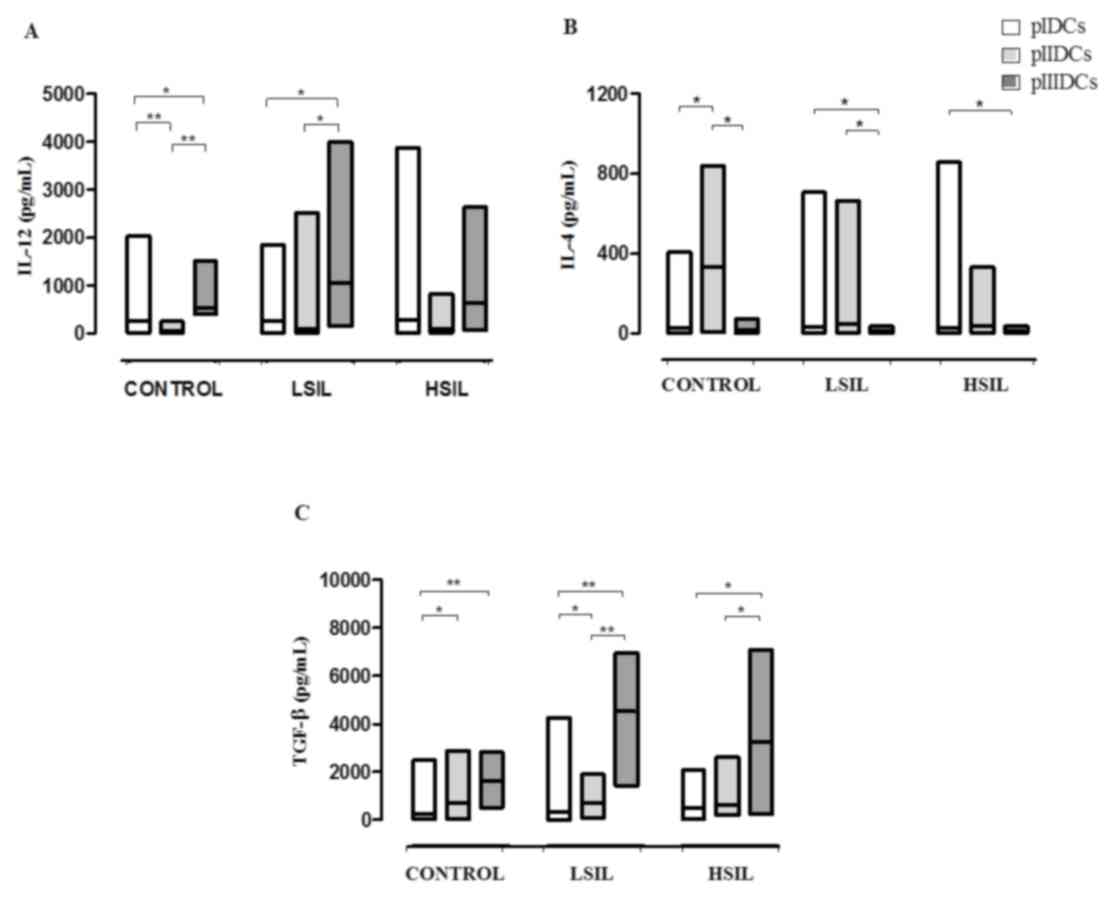|
1
|
Stewart BW and Wild CP: World Cancer
Report 2014. World Health Organization, IARC; Lyon: 2016
|
|
2
|
Apgar BS, Zoschnick L and Wright TC Jr:
The 2001 bethesda system terminology. Am Fam Phisician.
68:1992–1998. 2003.
|
|
3
|
Parkin DM and Bray F: Chapter 2: The
burden of HPV-related cancers. Vaccine. 24:(Suppl 3). 11–25. 2006.
View Article : Google Scholar
|
|
4
|
Gabrilovich DI, Corak J, Ciernik IF,
Kavanaugh D and Carbone DP: Decreased antigen presentation by
dendritic cells in patients with breast cancer. Clin Cancer Res.
3:483–490. 1997.PubMed/NCBI
|
|
5
|
Vopenkova K, Mollova K, Buresova I and
Michalek J: Complex evaluation of human monocyte-derived dendritic
cells for cancer immunotherapy. J Cell Mol Med. 16:2827–2837. 2012.
View Article : Google Scholar : PubMed/NCBI
|
|
6
|
Ferrantini M, Capone I and Belardelli F:
Dendritic cells and cytokines in immune rejection of cancer.
Cytokine Growth Factor Rev. 19:93–107. 2008. View Article : Google Scholar : PubMed/NCBI
|
|
7
|
Banchereau J and Steinman RM: Dendritic
cells and the control of immunity. Nature. 392:245–252. 1998.
View Article : Google Scholar : PubMed/NCBI
|
|
8
|
Steinman RM and Banchereau J: Taking
dendritic cells into medicine. Nature. 449:419–426. 2007.
View Article : Google Scholar : PubMed/NCBI
|
|
9
|
van Nierop K and de Groot C: Human
follicular dendritic cells: Function, origin and development. Semin
Immunol. 14:251–257. 2002. View Article : Google Scholar : PubMed/NCBI
|
|
10
|
Pulendran B, Smith JL, Caspary G, Brasel
K, Pettit D, Maraskovsky E and Maliszewski CR: Distinct dendritic
cell subsets differentially regulate the class of immune response
in vivo. Proc Natl Acad Sci USA. 96:1036–1041. 1999. View Article : Google Scholar : PubMed/NCBI
|
|
11
|
Kelleher P and Knight SC: IL-12 increases
CD80 expression and the stimulatory capacity of bone marrow-derived
dendritic cells. Int Immunol. 10:749–755. 1998. View Article : Google Scholar : PubMed/NCBI
|
|
12
|
Schwartz RH: A cell culture model for T
lymphocyte clonal anergy. Science. 248:1349–1356. 1990. View Article : Google Scholar : PubMed/NCBI
|
|
13
|
Banchereau J, Briere F, Caux C, Davoust J,
Lebecque S, Liu Y, Pulendran B and Palucka K: Immunobiology of
dendritic cells. Annu Rev Immunol. 18:767–811. 2000. View Article : Google Scholar : PubMed/NCBI
|
|
14
|
Randolph GJ, Sanchez-Schmitz G and Angeli
V: Factors and signals that govern the migration of dendritic cells
via lymphatics: Recent advances. Springer Semin Immunopathol.
26:273–287. 2005. View Article : Google Scholar : PubMed/NCBI
|
|
15
|
Palucka K and Banchereau J: Cancer
immunotherapy via dendritic cells. Nat Rev Cancer. 12:265–277.
2012. View
Article : Google Scholar : PubMed/NCBI
|
|
16
|
Liu YJ: Dendritic cell subsets and
lineages, and their functions in innate and adaptive immunity.
Cell. 106:259–262. 2001. View Article : Google Scholar : PubMed/NCBI
|
|
17
|
Bradley LM: Migration and T-lymphocyte
effector function. Curr Opin Immunol. 15:343–348. 2003. View Article : Google Scholar : PubMed/NCBI
|
|
18
|
Corthay A, Skovseth DK, Lundin KU, Røsjø
E, Omholt H, Hofgaard PO, Haraldsen G and Bogen B: Primary
antitumor immune response mediated by CD4+ T cells. Immunity.
22:371–383. 2005. View Article : Google Scholar : PubMed/NCBI
|
|
19
|
Pardoll DM and Topaliant SL: The role of
CD4+ T cell responses in antitumor immunity. Courrent Opin Immunol.
10:588–594. 1998. View Article : Google Scholar
|
|
20
|
Roncarolo MG, Bacchetta R, Bordignon C,
Narula S and Levings MK: Type 1 T regulatory cells. Immunol Rev.
182:68–79. 2001. View Article : Google Scholar : PubMed/NCBI
|
|
21
|
Fukaura H, Kent SC, Pietrusewicz MJ,
Khoury SJ, Weiner HL and Hafler DA: Induction of circulating myelin
basic protein and proteolipid protein-specific transforming growth
factor- beta 1-secreting Th3 T cells by oral administration of
myelin in multiple sclerosis patients. J Clin Invest. 98:70–77.
1996. View Article : Google Scholar : PubMed/NCBI
|
|
22
|
Koido S, Homma S, Takahara A, Namiki Y,
Tsukinaga S, Mitobe J, Odahara S, Yukawa T, Matsudaira H, Nagatsuma
K, et al: Current immunotherapeutic approaches in pancreatic
cancer. Clin Dev Immunol. 2011:2675392011. View Article : Google Scholar : PubMed/NCBI
|
|
23
|
Rodrigues CM, Matias BF, Murta EF and
Michelin MA: The role of T lymphocytes in cancer patients
undergoing immunotherapy with autologous dendritic cells. Clin Med
Insights Oncol. 5:107–115. 2011. View Article : Google Scholar : PubMed/NCBI
|
|
24
|
Matias BF, de Oliveira TM, Rodrigues CM,
Abdalla DR, Montes L, Murta EF and Michelin MA: Influence of
immunotherapy with autologous dendritic cells on innate and
adaptive immune response in cancer. Clin Med Insights Oncol.
7:165–172. 2013.PubMed/NCBI
|
|
25
|
Baxevanis CN, Perez SA and Papamichail M:
Combinatorial treatments including vaccines, chemotherapy and
monoclonal antibodies for cancer therapy. Cancer Immunol
Immunother. 58:317–324. 2009. View Article : Google Scholar : PubMed/NCBI
|
|
26
|
Sallusto BF and Lanzavecchia A: Efficient
presentation of solube antigen by cultured human dendritic cells is
maintained by granulocyte/macrophage colony-stimulating factor plus
interleukin 4 and downregulated by tumor necrosis factor alpha. J
Exp Med. 179:1109–1118. 1994. View Article : Google Scholar : PubMed/NCBI
|
|
27
|
Apostolopoulos V, Pietersz GA, Tsibanis A,
Tsikkinis A, Stojanovska L, McKenzie IF and Vassilaros S: Dendritic
cell immunotherapy: Clinical outcomes. Clin Transl Immunol.
3:e212014. View Article : Google Scholar
|
|
28
|
Figdor CG, de Vries IJ, Lesterhuis WJ and
Melief CJ: Dendritic cell immunotherapy: Mapping the way. Nat Med.
10:475–480. 2004. View
Article : Google Scholar : PubMed/NCBI
|
|
29
|
Han TH, Jin P, Ren J, Slezak S, Marincola
FM and Stroncek DF: Evaluation of 3 clinical dendritic cell
maturation protocols containing lipopolysaccharide and
interferon-gamma. J Immunother. 32:399–407. 2009. View Article : Google Scholar : PubMed/NCBI
|
|
30
|
ten Brinke A, Karsten ML, Dieker MC,
Zwaginga JJ and van Ham SM: The clinical grade maturation cocktail
monophosphoryl lipid A plus IFNgamma generates monocyte-derived
dendritic cells with the capacity to migrate and induce Th1
polarization. Vaccine. 25:7145–7152. 2007. View Article : Google Scholar : PubMed/NCBI
|
|
31
|
Snijders A, Kalinski P, Hilkens CM and
Kapsenberg ML: High-level IL-12 production by human dendritic cells
requires two signals. Int Immunol. 10:1593–1598. 1998. View Article : Google Scholar : PubMed/NCBI
|
|
32
|
Jonuleit H, Kühn U, Müller G, Steinbrink
K, Paragnik L, Schmitt E, Knop J and Enk AH: Pro-inflammatory
cytokines and prostaglandins induce maturation of potent
immunostimulatory dendritic cells under fetal calf serum-free
conditions. Eur J Immunol. 27:3135–3142. 1997. View Article : Google Scholar : PubMed/NCBI
|
|
33
|
Nicolette CA, Healey D, Tcherepanova I,
Whelton P, Monesmith T, Coombs L, Finke LH, Whiteside T and
Miesowicz F: Dendritic cells for active immunotherapy: Optimizing
design and manufacture in order to develop commercially and
clinically viable products. Vaccine. 25:(Suppl 2). B47–B60. 2007.
View Article : Google Scholar : PubMed/NCBI
|
|
34
|
Pinzon-Charry A, Maxwell T and López JA:
Dendritic cell dysfunction in cancer: A mechanism for
immunosuppression. Immunol Cell Biol. 83:451–461. 2005. View Article : Google Scholar : PubMed/NCBI
|
|
35
|
Wolf AM, Wolf D, Steurer M, Gastl G,
Gunsilius E and Grubeck-loebenstein B: Increase of regulatory T
Cells in the peripheral blood of cancer patients. Clin Cancer Res.
9:606–612. 2003.PubMed/NCBI
|
|
36
|
Blobe GC, Schiemann WP and Lodish HF: Role
of transforming growth factor beta in human disease. N Engl J Med.
342:1350–1308. 2000. View Article : Google Scholar : PubMed/NCBI
|
|
37
|
Luttmann W, Franz P, Schmidt S, Barth J,
Matthys H and Virchow JC Jr: Inhibition of HLA-DR expression on
activated human blood eosinophils by transforming growth
factor-beta1. Scand J Immunol. 48:667–671. 1998. View Article : Google Scholar : PubMed/NCBI
|
|
38
|
Orsini G, Legitimo A, Failli A, Ferrari P,
Nicolini A, Spisni R, Miccoli P and Consolini R: Defective
generation and maturation of dendritic cells from monocytes in
colorectal cancer patients during the course of disease. Int J Mol
Sci. 14:22022–22041. 2013. View Article : Google Scholar : PubMed/NCBI
|
|
39
|
Mocikat R, Braumüller H, Gumy A, Egeter O,
Ziegler H, Reusch U, Bubeck A, Louis J, Mailhammer R, Riethmüller
G, et al: Natural killer cells activated by MHC class I(low)
targets prime dendritic cells to induce protective CD8 T cell
responses. Immunity. 19:561–569. 2003. View Article : Google Scholar : PubMed/NCBI
|
|
40
|
Hermans IF, Silk JD, Gileadi U, Salio M,
Mathew B, Ritter G, Schmidt R, Harris AL, Old L and Cerundolo V:
NKT cells enhance CD4+ and CD8+ T cell responses to soluble antigen
in vivo through direct interaction with dendritic cells. J Immunol.
171:5140–5147. 2003. View Article : Google Scholar : PubMed/NCBI
|
|
41
|
Leslie DS, Vincent MS, Spada FM, Das H,
Sugita M, Morita CT and Brenner MB: CD1-mediated gamma/delta T cell
maturation of dendritic cells. J Exp Med. 196:1575–1584. 2002.
View Article : Google Scholar : PubMed/NCBI
|
|
42
|
Maldonado-López R, De Smedt T, Michel P,
Godfroid J, Pajak B, Heirman C, Thielemans K, Leo O, Urbain J and
Moser M: CD8alpha+ and CD8alpha- subclasses of dendritic cells
direct the development of distinct T helper cells in vivo. J Exp
Med. 189:587–592. 1999. View Article : Google Scholar : PubMed/NCBI
|
|
43
|
Dorman SE and Holland SM:
Interferon-gamama and interleukin-12 pathway defects and human
disease. Cytokine Growth Factor Rev. 11:321–333. 2000. View Article : Google Scholar : PubMed/NCBI
|
|
44
|
Heiser A, Coleman D, Dannull J, Yancey D,
Maurice MA, Lallas CD, Dahm P, Niedzwiecki D, Gilboa E and Vieweg
J: Autologous dendritic cells transfected with prostate-specific
antigen RNA stimulate CTL responses against metastatic prostate
tumors. J Clin Invest. 109:409–417. 2002. View Article : Google Scholar : PubMed/NCBI
|
|
45
|
Caramalho I, Lopes-Carvalho T, Ostler D,
Zelenay S, Haury M and Demengeot J: Regulatory T cells selectively
express toll-like receptors and are activated by
lipopolysaccharide. J Exp Med. 197:403–411. 2003. View Article : Google Scholar : PubMed/NCBI
|

















